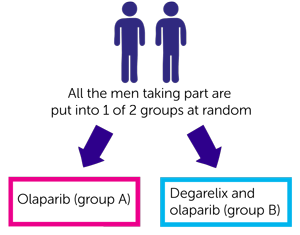A trial looking at olaparib and degarelix for men with prostate cancer (CaNCaP03)
Please note - this trial is no longer recruiting patients. We hope to add results when they are available.
Cancer type:
Status:
Phase:
This trial is looking at the effect of having olaparib and degarelix before surgery to remove prostate cancer (radical prostatectomy).
It is for men who are going to have surgery for prostate cancer that hasn’t spread outside the prostate gland.
More about this trial
 .
.  , which helps damaged cells to repair themselves. Doctors think that if they stop PARP-1 working, the cancer cells will not be able to repair themselves.
, which helps damaged cells to repair themselves. Doctors think that if they stop PARP-1 working, the cancer cells will not be able to repair themselves.  . Prostate cancer cells depend on this hormone to grow.
. Prostate cancer cells depend on this hormone to grow. - olaparib for 2 weeks
- degarelix and then olaparib for 2 weeks
- see how olaparib and degarelix work on prostate cancer cells
- learn more about the side effects of olaparib and degarelix
Who can enter
- have prostate cancer and doctors think surgery to remove the prostate gland (radical prostatectomy) is the best treatment for you
- have a cancer that has a high or intermediate risk of growing or spreading. Your doctor can tell you more about this
- are willing to have a sample of tissue taken (a biopsy) if there isn’t a suitable sample available (archival tumour sample)
- have satisfactory blood tests results
- have had a
chest x-ray  and it’s normal
and it’s normal - have a normal amount of oxygen in the blood (oxygen saturation)
- have no heart problems
- can swallow and absorb tablets
- are well enough to carry out your normal activities, apart from heavy physical work (performance status of 0 or 1)
- are at least 18 years old
- are willing to use reliable contraception during treatment and for 3 months afterwards if there is any possibility your partner could become pregnant
Who can’t take part
You cannot join this trial if any of these apply.
- have a condition called myelodysplastic syndrome (MDS) or a blood cancer called acute myeloid leukaemia (AML)
- have another cancer unless you have had treatment and there are no signs of the cancer coming back
- have moderate or severe side effects from previous anti cancer treatment, apart from hair loss
- have had an experimental treatment as part of another clinical trial in the last 3 months
- take drugs that affect some enzymes called CYP3A4, or the way your heart works. Your doctor can tell you more about this
- can’t take olaparib or degarelix for any reason
- are sensitive to olaparib, degarelix or anything it contains
- have a problem with your
digestive system  that affects how you absorb tablets
that affects how you absorb tablets - have had
pneumonitis  or any other major lung problem
or any other major lung problem - have
spinal cord compression  that isn’t controlled
that isn’t controlled - have heart problems such as an irregular heartbeat (arrhythmia) or you have had a heart attack in the past 3 months
- have a blockage in a large vein called superior vena cava
- have had a major surgery in the past month, or a small operation in the last 2 weeks, and you still have side effects from it
- have an infection that needs treatment
- have had a blood transfusion in the past month
- have hepatitis B or hepatitis C
- have HIV
- have any other serious medical condition that the trial team thinks could affect you taking part
Trial design
- olaparib (group A)
- degarelix and olaparib (group B)

- a week after the start of olaparib
- on the day of surgery
- 6 weeks after surgery
Hospital visits
- physical examination
- blood tests
- urine test
- heart trace (
ECG  )
) - chest x-ray
Side effects
Recruitment start:
Recruitment end:
How to join a clinical trial
Please note: In order to join a trial you will need to discuss it with your doctor, unless otherwise specified.
Chief Investigator
Dr Simon Pacey
Supported by
AstraZeneca
Cambridge Cancer Trials Centre
Cambridge University Hospitals NHS Foundation Trust
University of Cambridge
If you have questions about the trial please contact our cancer information nurses
Freephone 0808 800 4040



